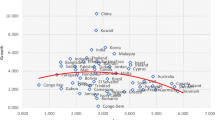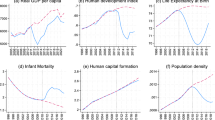Abstract
The present article tests predictions of rational political business cycle models using a large and previously unexplored data set of Portuguese municipalities. This data allows for a clean test of these predictions due to the high level of detail on expenditure items, an exogenous fixed election schedule, and homogeneity of Portuguese local governments with respect to policy instruments and institutions. Estimation results clearly reveal the opportunistic behaviour of local governments. In pre-electoral periods, they increase total expenditures and change their composition favouring items that are highly visible to the electorate. This behaviour is consistent with an effort to signal competence and increase chances of re-election.
Similar content being viewed by others
References
Arellano, M., & Bond, S. (1991). Some tests of specification for panel data: Monte Carlo evidence and an application to employment equations. The Review of Economic Studies, 58, 277–297.
Arellano, M., & Bover, O. (1995). Another look at the instrumental variable estimation of error-component models. Journal of Econometrics, 68, 29–51.
Baleiras, R.N., & Costa, J.S. (2004). To be in office again: an empirical test of a local political business cycle rationale. European Journal of Political Economy, 20, 655–671.
Baltagi, B.H. (2001). Econometric analysis of panel data (2nd ed.). Chichester: John Wiley & Sons.
Besley, T., & Case, A. (2003). Political institutions and policy choices: Evidence from the United States. Journal of Economic Literature, XLI(1), 7–73.
Blais, A., & Nadeau, R. (1992). The electoral budget cycle. Public Choice, 74, 389–403.
Blundell, R., & Bond, S. (1998). Initial conditions and moment restrictions in dynamic panel data models. Journal of Econometrics, 87, 115–143.
Cukierman, A., & Meltzer, A.H. (1986), A positive theory of discriminatory policy, the costs of democratic government and the benefits of a constitution. Economic Inquiry, 24, 367–388.
DGAL (1979–1983 and 1986–2000). Finančas Municipais, Direcčão Geral das Autarquias Locais (DGAL), Lisbon.
Drazen, A., & Eslava, M. (2005). Electoral manipulation via expenditure composition: Theory and evidence. NBER Working Paper W11085.
Galli, E., & Rossi, S. (2002). Political budget cycles: The case of the Western German Länder. Public Choice, 110, 283–303.
Hibbs, D. (1977). Political parties and macroeconomic policy. The American Political Science Review, 7, 1467–1487.
Nordhaus, W. (1975). The political business cycle. Review of Economic Studies, 42, 169–190.
Person, T., & Tabellini, G. (1990). Macroeconomic policy, credibility and politics. London: Harvood Academic Publishers.
Pettersson-Lidbom, P. (2001). An empirical investigation of the strategic use of debt. Journal of Political Economy, 109(3), 570–583.
Rogoff, K. (1990). Equilibrium political budget cycles. American Economic Review, 80, 21–36.
Rogoff, K., & Sibert, A. (1988). Elections and macroeconomic policy cycles. Review of Economics Studies, 55, 1–16.
Rosenberg, J. (1992). Rationality and the political business cycle: The case of local government. Public Choice, 73, 71–81.
Seitz, H. (2000). Fiscal policy, deficits and politics of subnational governments: The case of the German Laender. Public Choice, 102, 183–218.
Veiga, L.G. (2002). ‘The political economy of local governments’ expenditures. NIPE — Working Paper, 8/2002.
Veiga, L.G., & Veiga, F. J. (2004a). Popularity functions, partisan effects and support in Parliament. Economics & Politics, 16(1), 101–115.
Veiga, L.G., & Veiga, F. J. (2004b). The determinants of vote intentions in Portugal. Public Choice, 118(3–4), 341–364.
Windmeijer, F. (2000). A finite sample correction for the variance of linear two-step GMM estimators. Institute of Fiscal Studies Working Paper Series No W00/19.
Author information
Authors and Affiliations
Corresponding author
Additional information
JEL Classifications H72, D72, D78
Rights and permissions
About this article
Cite this article
Veiga, L.G., Veiga, F.J. Political business cycles at the municipal level. Public Choice 131, 45–64 (2007). https://doi.org/10.1007/s11127-006-9104-2
Received:
Accepted:
Published:
Issue Date:
DOI: https://doi.org/10.1007/s11127-006-9104-2




